The Importance of Correct Garbage Disposal Practices
The administration of waste is a vital aspect of environmental stewardship that often goes undetected in our every day lives. Correct waste disposal practices are not simply a matter of benefit but are essential for safeguarding our ecosystems and public wellness. From the consequences of improper garbage disposal on our setting to the long-term ramifications for future generations, the significance of embracing sustainable waste management techniques can not be overemphasized. By exploring the ecological impact of reckless waste disposal, the benefits of reusing campaigns, and the importance of neighborhood engagement in waste reduction initiatives, a much deeper understanding of why appropriate garbage disposal practices are vital emerges.
Ecological Influence of Improper Disposal
Improper disposal of waste positions a considerable hazard to the setting due to its detrimental effects on environments and human wellness. When waste is not effectively managed, it can result in pollution of the dirt, water, and air, causing harm to various plant and pet varieties. click here. Chemicals and contaminants from poorly disposed waste can permeate right into the ground, contaminating groundwater sources and affecting the health of both wildlife and humans
Additionally, the accumulation of waste in garbage dumps creates greenhouse gases like methane, adding to climate modification and worldwide warming. Incorrect disposal methods likewise lead to littering, which not only deteriorates the aesthetic value of the environment but can also damage wild animals via consumption or complexity.
To alleviate these environmental impacts, it is essential for communities and people to embrace appropriate waste disposal practices such as reusing, composting, and accountable harmful waste disposal. By taking these steps, we can assist protect communities, preserve natural sources, and guard human wellness for future and present generations.
Benefits of Recycling Programs
Frequently participating in recycling programs supplies many advantages for both the setting and culture as a whole. This preservation of resources not just assists in maintaining ecological equilibrium however also adds to sustainable growth.
In addition, recycling plays a vital role in minimizing power usage and greenhouse gas exhausts. The production of products from recycled products typically needs much less energy contrasted to manufacturing from virgin sources - medical waste disposal. As a result, the carbon impact connected with the production process is dramatically decreased, helping in the battle against climate adjustment
In addition, recycling programs produce task possibilities in the recycling sector, promoting financial growth and social well-being. By urging the recycling and reuse of materials, these programs sustain a circular economic situation that lessens waste generation and makes best use of resource performance, eventually bring about a cleaner, greener future for generations to find.
Contaminated Materials Management Standards
Implementing effective contaminated materials monitoring guidelines is crucial for lessening ecological and wellness risks related to the incorrect disposal of unsafe materials - click here. Proper handling, therapy, and disposal of unsafe waste are necessary to stop contamination of dirt, water resources, and air
One trick standard is proper labeling of dangerous waste containers to make sure risk-free handling and transport. In addition, centers must abide by stringent storage space demands to stop leakages, spills, or accidents that might jeopardize human health and wellness and the atmosphere. Normal training programs for workers on contaminated materials monitoring practices are likewise vital to guarantee conformity with regulations and advertise a culture of security.
Moreover, contaminated materials must be segregated based upon its residential properties to stop chain reactions that might bring about harmful scenarios. Executing a thorough waste tracking system can aid monitor the motion of unsafe products from generation to disposal, making sure openness and responsibility. By complying with these standards faithfully, companies and markets can contribute to a more secure and cleaner environment for present and future generations.
Community Participation in Waste Reduction
To properly deal see post with the ecological and health and wellness risks linked with dangerous waste monitoring, engaging the area in waste reduction efforts is critical. Area involvement plays an essential duty in promoting sustainable waste monitoring practices and fostering a society of ecological obligation. By educating homeowners about appropriate waste segregation, recycling, and composting strategies, neighborhoods can substantially decrease the quantity of waste sent out to land fills, thereby decreasing ecological pollution and conserving all-natural sources.
Community involvement in waste decrease programs also assists in elevating understanding concerning the importance of waste minimization and motivates people to embrace environment-friendly routines in their day-to-day lives - medical waste disposal. Collaborative efforts between neighborhood authorities, waste management companies, and area participants can lead to the implementation of reliable waste reduction strategies customized to the particular demands of each neighborhood or town
Furthermore, neighborhood engagement promotes a feeling of ownership and responsibility among residents, empowering them to take proactive steps towards reducing waste generation and advertising a cleaner, healthier environment for present and future generations. By working together towards common waste decrease objectives, communities can make a significant influence on minimizing the adverse effects of improper waste disposal methods.

Future of Sustainable Waste Practices
Standard waste disposal approaches, such as landfilling and incineration, are no longer sustainable in the long term due to their considerable environmental impacts. Moving ahead, the future of sustainable waste methods lies in accepting a round economic situation strategy, where sources are recycled, reused, or repurposed to decrease waste generation.
Technical innovations play an essential role fit the future of sustainable waste methods. Advanced waste sorting and recycling innovations can assist enhance the effectiveness of waste administration procedures, enabling the healing of beneficial sources from waste streams. In addition, the fostering of biodegradable materials and composting techniques can assist minimize the amount of organic waste winding up in land fills, thus minimizing greenhouse gas emissions.
Additionally, advertising consumer recognition and education and learning on appropriate waste segregation and disposal techniques is vital for driving behavior modification towards sustainability. By cultivating a society of waste reuse, decrease, and recycling, communities can jointly add to a cleaner and healthier setting for future generations.

Verdict
Finally, correct waste disposal methods are crucial for decreasing environmental effect and advertising sustainability. By executing reusing programs, managing dangerous waste effectively, and encouraging neighborhood involvement in waste reduction initiatives, we can function towards a cleaner and much healthier setting. It is essential for governments, individuals, and services to focus on lasting waste practices for the future health of our earth.

From the consequences of incorrect waste disposal on our environment to the long-term implications for future generations, the importance of embracing sustainable waste management practices can not be overstated. By exploring the environmental impact of irresponsible waste disposal, the benefits of recycling initiatives, and the importance of community engagement in waste decrease initiatives, a much deeper understanding of why correct waste disposal techniques are critical emerges.
By educating residents about proper waste segregation, reusing, and composting strategies, communities can significantly minimize the amount of waste sent to garbage dumps, consequently reducing environmental air pollution and preserving natural sources. (click here)
Relocating ahead, the future of sustainable waste practices exists in embracing a round economic situation strategy, where resources are reused, reused, or repurposed to lessen waste generation.
Advanced waste sorting and recycling technologies can assist enhance the efficiency of waste administration processes, enabling for the recovery of useful sources from waste streams.
Comments on “Structured Solutions: Simplifying Health Care Procedures with Professional Medical Waste Disposal”